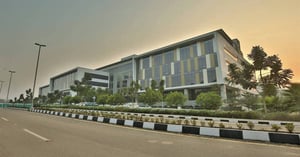Kochi is a port city on the southwest coast of India and part of the state of Kerala. It is set over 36.6 square miles and has a population of around 602,000. The city was selected as one of the first 20 Indian cities to be developed under Prime Minister Narendra Modi’s flagship Smart Cities Mission.
India’sSmart Cities Mission aims to create 100 smart cities in the country as a model for development and to bring improvements to nearby cities and towns. A total of ₹98,000 crores ($15 billion) has been approved by the Indian Cabinet for the development of 100 smart cities and the rejuvenation of 500 others over five years. Cities are selected through the Smart Cities Challenge, based on feasibility and potential social and economic impact.
Collaboration is key to a smarter Kochi
As well as creating a blueprint for future smart city development in India, India’s smart city mission also draws on collaboration with other countries, including Japan, the United States and France. In March 2016, Germany announced a partnership with India to develop Kochi, Bhubaneswar and Coimbatore as smart cities.
 Bart Gorynski, Managing Director of bee smart city, comments: “This approach shows the importance of not only cities collaborating but national governments too, sharing best practices and proven solutions between each other to accelerate the development of smart cities.” He adds: “To become a truly smart city, it is important not to think in terms of competition between each other, but rather to constantly compete with oneself to create even better places – by solving pressing issues, addressing current problems and seizing opportunities for social, urban and economic development.”
Bart Gorynski, Managing Director of bee smart city, comments: “This approach shows the importance of not only cities collaborating but national governments too, sharing best practices and proven solutions between each other to accelerate the development of smart cities.” He adds: “To become a truly smart city, it is important not to think in terms of competition between each other, but rather to constantly compete with oneself to create even better places – by solving pressing issues, addressing current problems and seizing opportunities for social, urban and economic development.”
Kochi’s strategy
Kochi’s leaders’ smart city vision is: “To transform Kochi into an inclusive vibrant city of opportunities with efficient urban services, sustainable growth and ease of living.” This includes: ensuring the city is connected and accessible; promoting smart mobility; creating a vibrant identity for Kochi; focusing on clean, green and healthy initiatives; and ensuring smart, inclusive governance.
 The total cost of the smart city transformation is calculated at 207.6 million Rupees ($3.25 million), and the work is being funded through a mixture of sources, including 50 million Rupees ($783,500) from the central Ministry of Urban Development and 57.7 million Rupees ($904,000) from the state smart city fund. The remainder is through convergence (50.5 million Rupees/$791,300), as well as public-private partnerships, loans and other funding (49.4 million Rupees/$774,000). As per all India’s smart cities, the program will be delivered via a special purpose vehicle (SPV), headed by a full-time CEO.
The total cost of the smart city transformation is calculated at 207.6 million Rupees ($3.25 million), and the work is being funded through a mixture of sources, including 50 million Rupees ($783,500) from the central Ministry of Urban Development and 57.7 million Rupees ($904,000) from the state smart city fund. The remainder is through convergence (50.5 million Rupees/$791,300), as well as public-private partnerships, loans and other funding (49.4 million Rupees/$774,000). As per all India’s smart cities, the program will be delivered via a special purpose vehicle (SPV), headed by a full-time CEO.
Some of the initiatives are focused on specific areas of Kochi, while others are delivered right across the city.
Area-based development
These area-based initiatives focus on the key challenges unique to particular parts of the city. Where relevant, they also function as pilot projects aimed at generating results and best practices that can be replicated elsewhere in the city.
Examples of these projects in Kochi include:
- Developing an integrated water transport system between the city’s Fort Kochi and Central City areas, including a modern ferry service, increased road accessibility to jetties, and renovation of existing jetties.
- Rejuvenating the city’s existing water canals and parks, and creating new plazas, canal walkways and green areas.
- Reclaiming the image of Fort Kochi-Mattancherry as a cultural and heritage capital, and the centre of the city as a commercial hub. This includes brand building (e.g. the Kochi Biennale) and redevelopment.
- Providing safe, seamless mobility for cyclists, pedestrians and vehicles via a green smart transportation network. This includes improving multi-modal transport links and last-mile connectivity with initiatives such as bike-sharing schemes. There is also a focus on promoting pedestrian-friendly and pedestrianized streets.
- Redevelopment of slum areas, ensuring access to high-quality basic services and amenities, including education and health infrastructure.
- Improving infrastructure with smart solutions such as Wi-Fi hotspots and public kiosks; smart traffic signal management; smart metering for water and electricity; and energy-efficient solar-based street lights.
Pan-city initiatives
These initiatives will be rolled out across the whole city at the same time. There are two major projects at the moment.
Digitizing city services
Kochi is working towards the integrated delivery of Government-to-Citizen (G2C) services using a smart card and a mobile platform/app. The initiative is being delivered using a two-phase approach. The first step is extending the smart card payment system already available on public transportation in Kochi to all city services. Following this, the city will provide an integrated mobile platform for citizen engagement and delivery of all city services.
Citizens will be able to access and manage all their city services via the Kochi Metro App. This will include transportation services (live schedules, route maps, mobile ticketing, etc.), public services (emergency alerts, utility bill payments, reporting issues, etc.), city information (city calendar, weather updates, tourism and business info, etc.) and m-commerce (e.g. cab booking, click and collect, local shopping). Infotainment services such as free Wi-Fi, music streaming and sports updates will also be available through the app.
Implementing intelligent water management
Kochi wants to use smart solutions to ensure clean water is available across the city at all times. This will involve using GPS/GPRS-enabled meters to capture automated meter data in a centralized location.
The aim is to enable efficient metering, billing and collection solutions, as well as a centralized command and control centre backed by efficient ICT infrastructure.
New IT opportunities for India
India’s smart city drive, such as the initiative in Kochi, could also create new opportunities for the country’s $150 billion IT sector.
India’s IT services and software industry has become a key economic contributor and spurred entrepreneurship. Research from the Reserve Bank of India shows that the sector accounted for 26% of India’s total merchandise exports in 2014–15.
However, analysis from trade body Nasscom predicted IT industry export growth in India would remain flat in 2017-18 at 7-8%, compared to 7.6% in 2016-17. In contrast, revenue for the domestic market is projected to grow at 10-11%, as well as creating 130,000-150,000 new jobs.
The McKinsey Global Institute notes that to date, “most Indians have failed to reap the full benefit of the nation’s technology expertise”. As smart cities in India develop, the country’s IT and software companies have the opportunity to take centre stage and develop digital products and services to tackle urban challenges at home.
An advanced opportunity
John Lovegin is CEO of Cubet Techno Labs, a design and development company with offices in India and the UK. He says: “Smart cities exist at the intersection of digital technology, disruptive innovation and urban environments. They are an exciting place to work and live and a breeding ground for new ideas.”
 Smart cities are an “advanced opportunity for the software and application development industry in India,” he notes, and developers have a key role to play in “area-based development” and “giving an identity to the country” through factoring in considerations such as the main economic drivers alongside technology needs. This could include local cuisine, health, education, arts and crafts, culture, sports goods, furniture, hosiery, textile, dairy, etc.
Smart cities are an “advanced opportunity for the software and application development industry in India,” he notes, and developers have a key role to play in “area-based development” and “giving an identity to the country” through factoring in considerations such as the main economic drivers alongside technology needs. This could include local cuisine, health, education, arts and crafts, culture, sports goods, furniture, hosiery, textile, dairy, etc.
Lovegin believes that smart city solutions which have the following characteristics will have the biggest impact in Indian cities such as Kochi:
- Make more efficient use of physical infrastructure through artificial intelligence and data analytics to support strong and healthy economic, social and cultural development.
- Effectively engage local people with local governance and decision-making through the use of open innovation processes and e-participation -- improve the collective intelligence of the city's institutions through e-governance.
- Learn, adapt and innovate and thereby respond more effectively and promptly to changing circumstances by improving the intelligence of the city.
 Dr. Alexander Gelsin, Managing Partner at bee smart city, concludes: “With the ongoing professionalization and specialization of its IT and software industry, India is well-positioned to develop smart city solutions. The IT and software industry, with its highly qualified talent and forward-thinking mindset, forms a perfect backbone to accelerate the dynamics of India’s smart city efforts after the basic infrastructure requirements have been installed and upgraded. The next phase of the smart cities mission will focus on the creation and implementation of smart city solutions.”
Dr. Alexander Gelsin, Managing Partner at bee smart city, concludes: “With the ongoing professionalization and specialization of its IT and software industry, India is well-positioned to develop smart city solutions. The IT and software industry, with its highly qualified talent and forward-thinking mindset, forms a perfect backbone to accelerate the dynamics of India’s smart city efforts after the basic infrastructure requirements have been installed and upgraded. The next phase of the smart cities mission will focus on the creation and implementation of smart city solutions.”
GET ACCESS TO PROVEN SMART CITY SOLUTIONS & EXPERTS
Explore best practice smart city solutions, share your expertise and learn from the global smart city community by joining bee smart city - the leading global smart city network & community. Become a part of our global community and grow your network.


